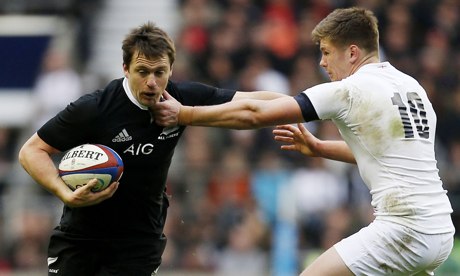
Thirteen matches, 13 wins: Steve Hansen said last week there is no such thing as perfect but his team are one win away from completing an immaculate season. Australia, South Africa, France, Argentina and now England have been beaten, none of them coming within seven points of winning. The All Blacks may lay their shtick on a little thick, like the Australia cricket team used to under Steve Waugh. The black jersey, like the baggy green cap, has an aura of its own simply because the players in it are so much better than everyone else. "The jersey," Hansen said, "is what it is because of the men that wear it."
The comparison to the Australian cricket team, who won three consecutive World Cups and had two separate streaks of 16 Tests wins in a row, is an apt one – and not just because they would be among the recent contenders for the title of "the most dominant team in history", as the All Blacks have called themselves. Waugh took over Australia when they were already the best side in the world. Together with his coach, John Buchanan, he had to find a way to kick on from No1. Which is exactly what Hansen and Richie McCaw had to do in the last two years.
Their year has been defined by three Tests, the two they have played against France and England in the past fortnight, and their extraordinary match against South Africa in Johannesburg at the start of October. Tellingly the All Blacks fell behind during the third quarter of each game. Against France they went 12-9 down at the start of the second half when Morgan Parra kicked his fourth penalty. Against South Africa the score was 27-24 after Jean de Villiers scored with 20 minutes to play and England were two points up when there was a similar amount of time left in the match.
Each time the All Blacks snapped back. Each time, extraordinarily, they scored a try inside the next four minutes and seized the lead. And each time, of course, they refused to let their grip slip again, but tightened it by stretching still further ahead. The All Blacks recognise that the opposition is seldom more vulnerable than when it has just scored, so that is when they attack hardest. They respond to the pressure by piling it back on to the opposition.
Against England they took advantage of the kind of minuscule mistakes that are almost inevitable when a team is exhausted after an hour of rugby and unsettled by the introduction of players off the bench. A single, thoughtless punt from Ben Foden, a pair of wayward throws from Tom Youngs –that was all it took for New Zealand to take control. It was a similar story against South Africa, when Beauden Barrett slipped through two tame tackles to scoot under the posts.
They are a little fitter, a little quicker and a little sharper than the opposition. But, more importantly, they are more ruthless and resilient, too. Only a hardened team can turn momentum around when it is against them late in the match. "The important thing," McCaw said after the England game, "is to realise that there is no point worrying about what has happened, how you let your lead slip. You have to stick to thinking about what you are going to do next." It is something McCaw, who has won more Test matches than England's entire back row have played in, learned a long time ago. The habit has become ingrained over time.
This is where this All Black team really have the edge. They have five players in their squad who have won more than 100 caps. But, unlike Waugh's Australia, they are not growing old together. The average age of their squad is 26 and they have used 42 different players in the last 12 months. Not many sides have a bigger pool of players. England, who sent a shadow team to tour Argentina in the summer, have used 46 in the same time, South Africa 36. Consistent selection used to be a prerequisite for any successful side. But it is not for this New Zealand team. Only Ben Smith has started all 13 games this year.
The turnover means that the younger players are learning from the old hands alongside them and at the same time the older players are under pressure for their places – Cory Jane started against France and did not even make the bench against England. It also allows Hansen to rest key players, such as McCaw and Dan Carter, who, injured on Saturday, is starting a six-month sabbatical. They will be without him against Ireland but, with Aaron Cruden and Barrett in the squad, they will not necessarily miss him much. And the break gives him a good chance of making the 2015 World Cup.
By then this team will be even better than it is now. Hansen and McCaw have managed to do what Waugh and Buchanan never could, or Martin Johnson and Clive Woodward either, for that matter. They have built a side that spans two generations of players and, by combining the best of both, have done it without compromising their performance. The best are only getting better.

